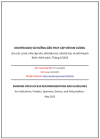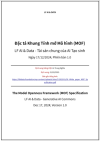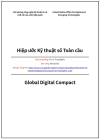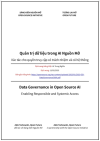By Andrew Jacobs
Published: June 8, 2009
Theo:http://www.nytimes.com/2009/06/09/world/asia/09china.html
Bài được đưa lênInternet ngày: 08/06/2009
Bắc Kinh – Trung Quốcđã đưa ra một chỉ thị bao quát yêu cầu tất cả cácmáy tính cá nhân được bán tại quốc gia này đưa vàophần mềm phức tạp mà có thể lọc bỏ khiêu dâm và“các thông tin không lành mạnh” khác từ Internet.
Phần mềm này, màcác nhà sản xuất phải cài đặt lên tất cả các máytính cá nhân mới kể từ ngày 01/07, có thể cho phépchính phủ thường xuyên cập nhật các máy tính với mộtdanh sách thay đổi từ trước tới nay các website bị cấm.
Những qui định này,đã được đưa ra vào tháng trước, gắn vào những hạnchế Internet mà nó đã là nghiêm ngặt nhất trên thếgiới. Trung Quốc thường xuyên khoá các website mà bànluận về Dalai Lama, vụ trừng trị năm 1989 đối vớinhững người phản đối tại quảng trường Thiên An Môn,và Falun Gong, phong trào tôn giáo bị cấm.
Nhưng những ngườibảo vệ cho tự do phát ngôn nói họ sợ phần mềm mớinày có thể làm cho còn khó khăn hơn cho 300 triệu ngườisử dụng Internet của Trung Quốc có được các thông tinkhông bị kiểm duyệt.
“Đây là một thứrất tồi tệ”, C-harles Mok, chủ tịch của hội Hong Kongvề Xã hội Internet, một nhóm tư vấn quốc tế về cáctiêu chuẩn Internet, nói. “Nó giống như việc tải vềphần mềm gián điệp vào máy tính của bạn, nhưng chínhphủ lại là gián điệp”.
Được gọi là QuỷXanh – một tham chiếu tới những khẩu hiệu mà chúng môtả một Internet không có vết nhơ như “Xanh” - phầnmềm này được thiết kế để lọc ra các tranh ảnh vàtừ ngữ hoàn toàn về nhục dục, theo công ty mà đãthiết kế ra nó. Tuy nhiên, các chuyên gia máy tính cảnhbáo rằng một khi được cài đặt, phần mềm này có thểđược ra lệnh để khoá tất cả các dạng nội dung hoặccho phép chính phủ giám sát sử dụng và thu thập cácthông tin cá nhân.
Các chi tiết củanhững qui định mới này, mà đã được đưa lên hôm thứhai trên một website chính phủ, lần đầu tiên đã đượcđưa tin bởi tạp chí phố Uôn.
BEIJING— Chinahas issued a sweeping directive requiring all personal computers soldin the country to include sophisticated software that can filter outpornography and other “unhealthy information” f-rom the Internet.
Thesoftware, which manufacturers must install on all new PCs startingJuly 1, would allow the government to regularly up-date computers withan ever-changing list of banned Web sites.
Therules, issued last month, ratchet up Internet restrictions that arealready among the most stringent in the world. China regularly blocksWeb sites that discuss the DalaiLama, the 1989 crackdown on Tiananmen Square protesters, and theFalun Gong, the bannedspiritual movement.
Butfree-speech advocates say they fear the new software could make iteven more difficult for China’s 300 million Internet users toobtain uncensored news and information.
“Thisis a very bad thing,” said C-harles Mok, chairman of the Hong Kongchapter of the Internet Society,an international advisory group on Internet standards. “It’s likedownloading spyware onto your computer, but the government is thespy.”
CalledGreen Dam — a reference toslogans that describe a smut-free Internet as “green” — thesoftware is designed to filter out sexually explicit images andwords, according to the company that designed it. Computer experts,however, warn that once installed, the software could be directed toblock all manner of content or allow the government to monitorInternet use and collect personal information.
Detailsof the new regulations, which were posted Monday on a government Website, were first reported by The Wall Street Journal.
Các nhà sản xuấtmáy tính cá nhân mà phục vụ thị trường Trung Quốc,trong đó có Dell, Lenovo và HP, nói họ đã nghiên cứunhững qui định này và đã từ chối bình luận. Nhưngmột cách cá nhân, các lãnh đạo doanh nghiệp tại Mỹnói họ đã bị mất hết nhuệ khí bởi các qui địnhmới này, mà nó đã được đưa ra bởi Bộ Công nghiệpvà Công nghệ Thông tin mà không có sự tư vấn và cảnhbáo trước.
Ngoài vấn đề gâyphát cáu này về việc tiếp tay kiểm duyệt của chínhphủ, họ nói 6 tuần là không đủ thời gian để chuyểnsự sản xuất trên một phạm vi rộng lớn như thế này.“Nhiều người trong chúng tôi sẽ nghẹn cổ với chỉthị này”, một lãnh đạo nói. “Nó đã đặt mọingười vào chế độ báo động số 5”.
Đây không phải làlần đầu tiên mà các công ty nước ngoài đã đượctuyển trong những nỗ lực của chính phủ để kiểm soátInternet. Google đã loại bỏ vì chính trị những kết quảbị cấm sinh ra bởi máy tìm kiếm nổi tiếng của hãng,Microsoft cho phép kiểm duyệt để khoá các nội dung trêndịch vụ blog của hãng, và Yahoo đã bị chỉ trích mộtcách rộng rãi vì chuyển qua các thông tin mà chúng đãđược sử dụng để bắt giam một nhà báo.
“Tôi có thể tư vấncho những người bất đồng mua các máy tính trước ngày01/07”, Clothilde le Coz, người đứng đầu của bộ phậntự do cho Internet của Nhà báo Không Biên giới, nói.
Hơn 40 triệu máy tínhcá nhân đã được bán năm ngoái tại Trung Quốc, mộttrong những thị trường tăng trưởng nhanh nhất. Bấtchấp nền kinh tế chậm lại, các nhà phân tích côngnghiệp dự kiến rằng con số tăng trưởng 3% vào nămnay.
PCmakers that serve the Chinese market, among them Dell,Lenovo and Hewlett-Packard,said they were studying the new rules and declined to comment. Butprivately, industry executives in the United States said they wereunnerved by the new rules, which were issued by the Ministry ofIndustry and Information Technology with no consultation and noadvance warning.
Beyondthe nettlesome issue of abetting government censorship, they said sixweeks was not enough time to shift production on such a large scale.“Many of us are going to take it in the neck with this mandate,”said one executive. “It has put people into five-alarm mode.”
Thisis not the first time that foreign companies have been enlisted ingovernment efforts to police the Internet. Googlealready removes politically forbidden results yielded by its popularsearch engine, Microsoftallows censors to block content on its blog service, and Yahoowas widely criticized for turning over information that was used tojail a journalist.
“Iwould advise dissidents to buy computers before July 1,” saidClothilde Le Coz, the head of the Internet freedom desk of ReportersWithout Borders.
Morethan 40 million personal computers were sold last year in China, oneof the fastest growing markets. Despite the slowing economy, industryanalysts expect that figure to rise by 3 percent this year.
Một nhóm các đạidiện công nghiệp đã gặp với các quan chức Mỹ hôm thứhai để biểu thị sự không hài lòng của họ với nhữngqui định mới này, Susan N. Stevenson, một người phát ngôncho Sứ quán Mỹ tại Bắc Kinh, nói. “Chúng tôi coi bấtkỳ ý định hạn chế nào cho dòng chảy tự do các thôngtin với mối lo ngại to lớn”, bà nói.
Zhang Chenming, tổnggiám đốc của Jinhui Computer System Engineering, một công tymà đã giúp tạo ra Quỷ Xanh, nói những lo lắng mà phầnmềm này có thể được sử dụng để kiểm duyệt mộtdãy lớn các nội dung hoặc giám sát sử dụng Internet đãbị thổi phồng quá đáng. Ông đã khăng khăng rằng phầnmềm này, mà nó vô hiệu hoá các chương trình đượcthiết kế để vượt qua cái gọi là Tường lửa Lớncủa Trung Quốc, có thể đơn giản bị xoá hoặc tạmthời tắt bởi người sử dụng. “Một phụ huynh có thểvẫn sử dụng máy tính này để tới site khiêu dâm”,ông nói.
Mặc dù chỉ thị nàylà gì đó không chính xác và gợi ý rằng các nhà sảnxuất có thể cung cấp phần mềm như một đĩa CD, thì nócũng nói rằng nó phải được cài đặt lên ổ cứng máytính như một tệp sao lưu. Có 5 điểm khoanh tròn sử dụngtừ “cài đặt trước” lặp đi lặp lại và mệnh đềđầu tiên nói rõ: “Các máy tính nhập khẩu phải càiđặt trước phiên bản có sẵn mới nhất của phần mềm'Quỷ Xanh' trước khi chúng được bán tại Trung Quốc”.
Agroup of industry representatives met with American officials Mondayto express their displeasure with the new rules, said Susan N.Stevenson, a spokeswoman for the United States Embassy in Beijing.“We view any attempt to restrict the free flow of information withgreat concern,” she said.
ZhangChenming, general manager of Jinhui Computer System Engineering, acompany that helped cre-ate Green Dam, said worries that the softwarecould be used to censor a broad range of content or monitor Internetuse were overblown. He insisted that the software, which neutralizesprograms designed to override China’s so-called Great Firewall,could simply be de-leted or temporarily turned off by the user. “Aparent can still use this computer to go to porn,” he said.
Althoughthe directive is somewhat imprecise and suggests that manufacturerscan provide the software as a compact disc, it also says that it mustbe installed on computer hard drives as a backup file. The five-pointcircular uses the word “preinstall” repeatedly and the firstclause unequivocally states: “Imported computers shall preinstallthe latest available version of the ‘Green Dam’ software beforethey are sold in China.”
Các nhà sản xuấtkêu rằng họ đã được biết ít chỉ dẫn của các nhàchức trách Trung Quốc. “Câu chữ có thể cố tình mơhồ, nhưng thông điệp thì rõ ràng: chúng tôi không có sựlựa chọn về vấn đề này”, một lãnh đạo hãng máytính xin được dấu tên nói vì một số công ty đang hyvọng họ có thể thuyết phục được chính phủ giảmnhẹ các yêu cầu.
Các chuyên gia côngnghiệp và những người dân tự do chủ nghĩa nói họ lolắng phần mềm này có thể đơn giản là một con ngựaTrojan (thành Tơ Roa) cho việc kiểm soát Internet gắt gaohơn. Các lập trình viên phần mềm này đã gắn với quânđội và các cơ quan an ninh nhà nước Trung Quốc, họ chỉra, và những người ủng hộ Quỷ Xanh nói nỗ lực nàyđược ủng hộ bởi Li Changchun, quan chức lãnh đạotuyên truyền của đất nước này và một thành viên cơquan ra quyết định của Đảng Cộng Sản.
Manufacturerscomplain that they have had been given little guidance by Chineseauthorities. “The wording may be intentionally vague, but themessage is clear: we have no choice in the matter,” said onecomputer executive who spoke on condition of anonymity because somecompanies are hoping they can persuade the government to ease therequirements.
Industryexperts and civil libertarians say they are worried the software maysimply be a Trojan horse for greater Internet control. The softwaredevelopers have ties to China’s military and public securityagencies, they point out, and Green Dam’s backers say the effort issupported by Li Changchun, the country’s chief propaganda officialand a member of the decision-making body of the Communist Party, thePolitburo Standing Committee.
Thesoftware will be provided free, paid for by the government, andaccording to the official Green Dam Web site, it has already beendownloaded 3.2 million times. That figure includes thousands ofschools that were required to install the software by the end of May.The site claims that Chinese manufacturers, including Lenovo, Inspurand Hedy, have already agreed to install 52 million copies of thesoftware on new computers.
Inrecent months China has tightened its Internet restrictions,including an “antivulgarity” campaign that has closed downthousands of pornographic sites but also nonsexual sites, includingsome of the most popular bulletin boards and blog hosts. Chinaalready employs more than 30,000 censors and thousands who “guidepublic opinion” by flooding bulletin boards with comments favorableto the Communist Party.
Tuần trước, khi kỷniệm 20 năm sự kiện của quân đội đối với nhữngngười chống đối tại quảng trường Thiên An Môn đãtới gần, chính phủ đã khoá một máy thủ dịch vụInternet, bao gồm cả Twitter, live.com của Microsoft vàFlickr, một site chia sẻ ảnh, dù vào chiều thứ hai, cácsite này đã lại trở nên sẵn sàng trở lại. YouTube đãbị cấm truy cập tại Trung Quốc ngoài Hong Kong kể từtháng 03.
Ngay cả ngoài nhữnglo lắng về đạo đức, những người đã từng kiểm thửphần mềm này đã mô tả nó là không hoàn thiện về mặtkỹ thuật. Một kỹ sư phần mềm Mỹ nói nó đã làm chocác máy tính thường xuyên chết. Những người khác thìlo lắng rằng nó có thể làm cho hàng chục triệu máytính có thể bị tổn thương đối với các tin tặc. Chotới nay, ít nhất, không có phiên bản nào cho hệ điềuhành Linux và cho hệ thống Macintosh của Apple.
Hôm thứ hai, websitecủa riêng Quỷ Xanh đã đưa ra một gợi ý bóng gió vềsự không hài lòng về phần mềm lọc này. Trong phầnbảng tin của site này, một người viết đã mô tả nónhư một “con quỷ Web” và một vài người sử dụng đãkêu rằng các ảnh khiêu dâm đã trượt qua hoặc các máytính của họ đã trở nên chậm lại một cách đau đớn.“Dường như khá ghê sợ tới giờ”, một bài viếtnói. “Nó không quá mạnh; tôi không thể lướt Internetmột cách bình thường và điều đó ảnh hưởng tớihoạt động của các phần mềm khác”.
Tuy nhiên, vào tốihôm thứ hai, hầu hết các bình luận đã bị xoá.
Lastweek, as the 20th anniversary of the military crackdown on theTiananmen Square protests approached, the government blocked a hostof Internet services, including Twitter,Microsoft’s live.com andFlickr, a photo-sharing site, though by Monday evening, these siteshad become available again. YouTubehas been inaccessible in China outside Hong Kong since March.
Evenbeyond ethical concerns, those who have tested the new softwaredescribe it as technically flawed. An American software engineer saidit led machines to crash frequently. Others worry that it could leavetens of millions of computers vulnerable to hackers. So far, atleast, there is no version for the Linux operating system and forApple’sMacintosh system.
Thedirective makes no mention of the special administrative regions ofHong Kong and Macao, but one industry association executive saidcompanies had been told that these areas are exempt f-rom the newrules.
OnMonday, Green Dam’s own Web site offered a hint of discontent overthe filtering software. On the bulletin board section of the site,one writer described it as a “Web devil” and several userscomplained that pornographic images slipped through or that theircomputers had become painfully slow. “It seems pretty lousy sofar,” one posting said. “It’s not very powerful; I can’t surfthe Internet normally and it’s affecting the operation of othersoftware.”
ByMonday night, however, most of the comments had been de-leted.
Dịch tài liệu: LêTrung Nghĩa
Ý kiến bạn đọc
Những tin mới hơn
Blog này được chuyển đổi từ http://blog.yahoo.com/letrungnghia trên Yahoo Blog sang sử dụng NukeViet sau khi Yahoo Blog đóng cửa tại Việt Nam ngày 17/01/2013.Kể từ ngày 07/02/2013, thông tin trên Blog được cập nhật tiếp tục trở lại với sự hỗ trợ kỹ thuật và đặt chỗ hosting của nhóm phát triển...
 DigComp 3.0: Khung năng lực số châu Âu
DigComp 3.0: Khung năng lực số châu Âu
 Các bài toàn văn trong năm 2025
Các bài toàn văn trong năm 2025
 Các bài trình chiếu trong năm 2025
Các bài trình chiếu trong năm 2025
 Các lớp tập huấn thực hành ‘Khai thác tài nguyên giáo dục mở’ tới hết năm 2025
Các lớp tập huấn thực hành ‘Khai thác tài nguyên giáo dục mở’ tới hết năm 2025
 Tập huấn thực hành ‘Khai thác tài nguyên giáo dục mở’ cho giáo viên phổ thông, bao gồm cả giáo viên tiểu học và mầm non tới hết năm 2025
Tập huấn thực hành ‘Khai thác tài nguyên giáo dục mở’ cho giáo viên phổ thông, bao gồm cả giáo viên tiểu học và mầm non tới hết năm 2025
 Các tài liệu dịch sang tiếng Việt tới hết năm 2025
Các tài liệu dịch sang tiếng Việt tới hết năm 2025
 Loạt bài về AI và AI Nguồn Mở: Công cụ AI; Dự án AI Nguồn Mở; LLM Nguồn Mở; Kỹ thuật lời nhắc;
Loạt bài về AI và AI Nguồn Mở: Công cụ AI; Dự án AI Nguồn Mở; LLM Nguồn Mở; Kỹ thuật lời nhắc;
 Tổng hợp các bài của Nhóm các Nhà cấp vốn Nghiên cứu Mở (ORFG) đã được dịch sang tiếng Việt
Tổng hợp các bài của Nhóm các Nhà cấp vốn Nghiên cứu Mở (ORFG) đã được dịch sang tiếng Việt
 Tổng hợp các bài của Liên minh S (cOAlition S) đã được dịch sang tiếng Việt
Tổng hợp các bài của Liên minh S (cOAlition S) đã được dịch sang tiếng Việt
 Năm Khoa học Mở & Chuyển đổi sang Khoa học Mở - Tổng hợp các bài liên quan
Năm Khoa học Mở & Chuyển đổi sang Khoa học Mở - Tổng hợp các bài liên quan
 Bàn về 'Lợi thế của doanh nghiệp Việt là dữ liệu Việt, bài toán Việt' - bài phát biểu của Bộ trưởng Nguyễn Mạnh Hùng ngày 21/08/2025
Bàn về 'Lợi thế của doanh nghiệp Việt là dữ liệu Việt, bài toán Việt' - bài phát biểu của Bộ trưởng Nguyễn Mạnh Hùng ngày 21/08/2025
 Bạn cần biết những gì về các khung năng lực AI mới của UNESCO cho học sinh và giáo viên
Bạn cần biết những gì về các khung năng lực AI mới của UNESCO cho học sinh và giáo viên
 Khung năng lực AI cho giáo viên
Khung năng lực AI cho giáo viên
 ‘KHUYẾN NGHỊ VÀ HƯỚNG DẪN TRUY CẬP MỞ KIM CƯƠNG cho các cơ sở, nhà cấp vốn, nhà bảo trợ, nhà tài trợ, và nhà hoạch định chính sách’ - bản dịch sang tiếng Việt
‘KHUYẾN NGHỊ VÀ HƯỚNG DẪN TRUY CẬP MỞ KIM CƯƠNG cho các cơ sở, nhà cấp vốn, nhà bảo trợ, nhà tài trợ, và nhà hoạch định chính sách’ - bản dịch sang tiếng Việt
 50 công cụ AI tốt nhất cho năm 2025 (Đã thử và kiểm nghiệm)
50 công cụ AI tốt nhất cho năm 2025 (Đã thử và kiểm nghiệm)
 ‘Đặc tả Khung Tính mở Mô hình (MOF)’ của LF AI & Data - Tài sản chung của AI Tạo sinh - bản dịch sang tiếng Việt
‘Đặc tả Khung Tính mở Mô hình (MOF)’ của LF AI & Data - Tài sản chung của AI Tạo sinh - bản dịch sang tiếng Việt
 ‘LỘ TRÌNH CỦA TỔNG THƯ KÝ LIÊN HIỆP QUỐC VỀ HỢP TÁC KỸ THUẬT SỐ THÚC ĐẨY HÀNG HÓA CÔNG CỘNG KỸ THUẬT SỐ’ - bản dịch sang tiếng Việt
‘LỘ TRÌNH CỦA TỔNG THƯ KÝ LIÊN HIỆP QUỐC VỀ HỢP TÁC KỸ THUẬT SỐ THÚC ĐẨY HÀNG HÓA CÔNG CỘNG KỸ THUẬT SỐ’ - bản dịch sang tiếng Việt
 AI trong TVET - Một vài gợi ý triển khai trong thực tế
AI trong TVET - Một vài gợi ý triển khai trong thực tế
 Khung năng lực AI cho học sinh
Khung năng lực AI cho học sinh
 Tài sản chung kỹ thuật số và Hàng hóa Công cộng Kỹ thuật số - Tìm thấy nền tảng chung cho các nhà hoạch định chính sách
Tài sản chung kỹ thuật số và Hàng hóa Công cộng Kỹ thuật số - Tìm thấy nền tảng chung cho các nhà hoạch định chính sách
 Tọa đàm ‘Vai trò của Tài nguyên Giáo dục Mở trong chuyển đổi số giáo dục đại học’ tại Viện Chuyển đổi số và Học liệu - Đại học Huế, ngày 12/09/2025
Tọa đàm ‘Vai trò của Tài nguyên Giáo dục Mở trong chuyển đổi số giáo dục đại học’ tại Viện Chuyển đổi số và Học liệu - Đại học Huế, ngày 12/09/2025
 12 dự án AI Nguồn Mở hàng đầu để bổ sung vào kho công nghệ của bạn. 11. Hugging Face Transformers
12 dự án AI Nguồn Mở hàng đầu để bổ sung vào kho công nghệ của bạn. 11. Hugging Face Transformers
 ‘Hiệp ước Kỹ thuật số Toàn cầu’ của Liên hiệp quốc - bản dịch sang tiếng Việt
‘Hiệp ước Kỹ thuật số Toàn cầu’ của Liên hiệp quốc - bản dịch sang tiếng Việt
 Dự án DIAMAS đưa ra Khuyến nghị và Hướng dẫn Truy cập Mở Kim cương
Dự án DIAMAS đưa ra Khuyến nghị và Hướng dẫn Truy cập Mở Kim cương
 50 công cụ AI tốt nhất cho năm 2025 (Đã thử và kiểm nghiệm) - Trợ lý AI tốt nhất (chatbots)
50 công cụ AI tốt nhất cho năm 2025 (Đã thử và kiểm nghiệm) - Trợ lý AI tốt nhất (chatbots)
 Hướng dẫn kỹ thuật lời nhắc. Kỹ thuật viết lời nhắc. Lời nhắc Tái Hành động (ReAct)
Hướng dẫn kỹ thuật lời nhắc. Kỹ thuật viết lời nhắc. Lời nhắc Tái Hành động (ReAct)
 ‘Quản trị dữ liệu trong AI Nguồn Mở. Xúc tác cho quyền truy cập có trách nhiệm và có hệ thống’ - bản dịch sang tiếng Việt
‘Quản trị dữ liệu trong AI Nguồn Mở. Xúc tác cho quyền truy cập có trách nhiệm và có hệ thống’ - bản dịch sang tiếng Việt
 Vì sao Singapore đang xây dựng hàng hóa công cộng kỹ thuật số
Vì sao Singapore đang xây dựng hàng hóa công cộng kỹ thuật số
 50 công cụ AI tốt nhất cho năm 2025 (Đã thử và kiểm nghiệm) - Trình tạo nhạc AI tốt nhất
50 công cụ AI tốt nhất cho năm 2025 (Đã thử và kiểm nghiệm) - Trình tạo nhạc AI tốt nhất
 Chiến lược 2023-2028 của DPGA
Chiến lược 2023-2028 của DPGA